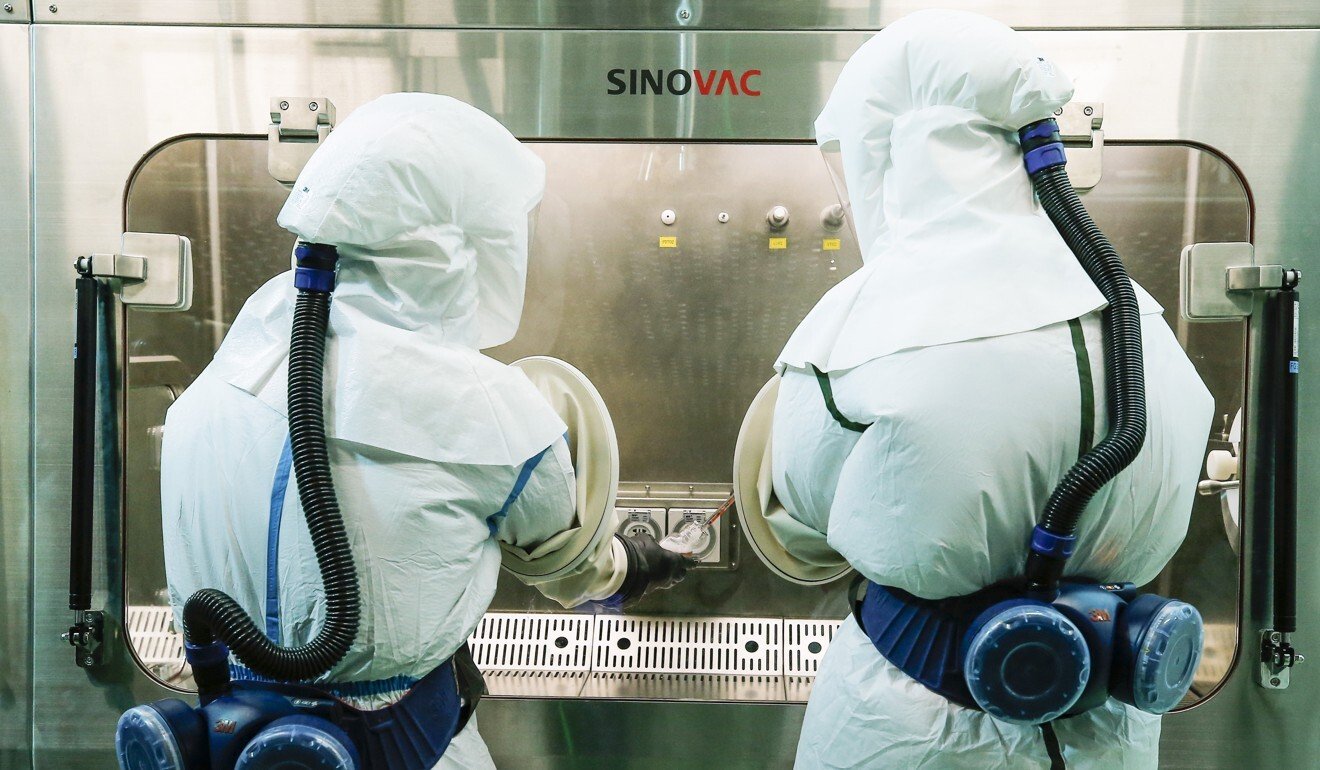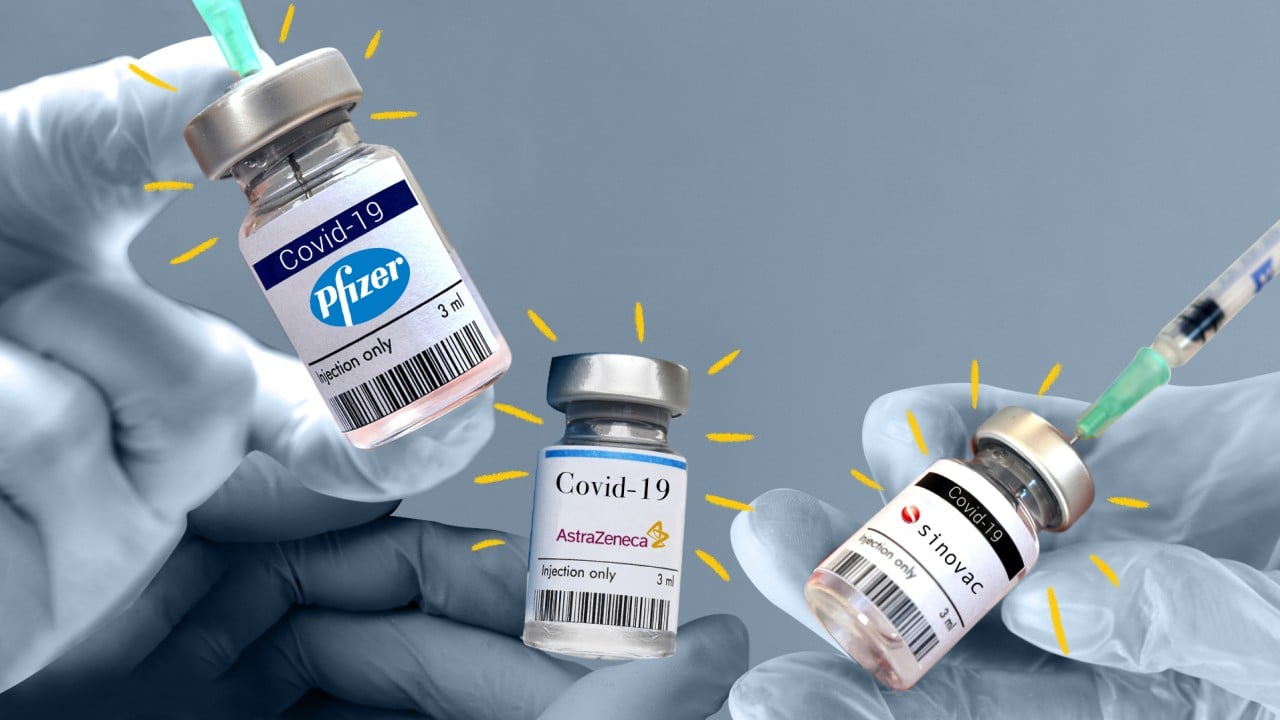
Coronavirus: vaccine pipeline bulges, but many won’t move out of the laboratory
- After an unprecedented effort to develop them, the WHO says more than 81 candidates have entered or passed human trials
- More than 350 million people have been immunised so far, however current vaccines are seen as works in progress
WHO’s chief scientist Soumya Swaminathan said in an interview with Bloomberg that up to eight new Covid-19 vaccines, which would not require needles or cold storage, could be ready for use later this year or in 2022.
An ideal vaccine needs to tick a lot of boxes: highly effective against infection and disease transmission; offers long-lasting protection; safe, with a lack of side effects; easy to ship and store, ideally at room temperature; and simple and cheap to make.
But many under development for Covid-19 are unlikely to progress beyond the laboratory, said professor Adrian Esterman, chair of biostatistics and epidemiology at the University of South Australia.
“Many of these more than 200 candidate vaccines will never reach clinical trial phase or will be stopped during the clinical trial phase,” he said.
Vaccine bullseye
So far, more than 350 million people worldwide have received vaccinations against Covid-19, which has infected nearly 120 million people.
Jin Dong-yan, a molecular virologist at the University of Hong Kong, said current Covid-19 vaccines were still, in effect, works in progress.
Second- or third-generation vaccines could be developed that were more effective for future use, even as the pandemic caused by Sars-CoV-2 was brought under control, he said.

Sarah Palmer, co-director of the centre for virus research at the Westmead Institute for Medical Research in Australia, said scientists would look to develop vaccines that target regions of the virus that do not mutate and so will remain effective against new variants.
These non-mutating parts are known as “conserved” areas in vaccine development terminology and Palmer and her team have developed a means to identify regions of the spike protein and other parts of Sars-Cov-2 that are conserved.
“That still has a long way to go. But we do believe that by focusing on these parts of the proteins that are conserved, they could make a vaccine that may be effective against most variants,” Palmer said.
Global attention
The US has been hit hardest by the virus – nearly 30 million infections and over 530,000 deaths – since it was first identified in China in late 2019.
According to Unicef, the US also leads the world with 102 Covid-19 vaccine developers, followed by 31 in China, and Canada with 22.
Sarah Pitt, virologist and principal lecturer of the school of pharmacy and biomolecular sciences at the University of Brighton in Britain, said Covid-19 attracted vaccine developers because of the urgent demand worldwide. It is also a question of economics.
“[For] Covid-19, we will be vaccinating everybody in the whole world for more months. You can make your money from that,” Pitt said.
She added that the Covax Facility, the WHO-led global initiative for fair distribution of vaccines, is now vital to ensure global access to Covid-19 vaccines.

06:05
One year into Covid-19 pandemic, world marks anniversary of WHO’s declaration on coronavirus
Palmer, who is also a professor at the University of Sydney school of medicine, said equal access to vaccines globally could prevent the virus from mutating to its advantage, such as becoming more infectious and being able to evade the human immune system.
“What we really need to do is get everyone vaccinated as soon as possible. Reduce viral replication, and reduce the variants arising. If we could do that, we’ll have a better chance in combating this virus,” she said.
Vaccine hurdles
Besides Covax, other partnerships are under way to boost global vaccine supply.
British-Swedish biotech company AstraZeneca has partnered with Serum Institute of India, the world’s largest vaccine manufacturer, to produce inoculations for low- and middle-income nations.
But conflicts have arisen already as shipment delays had knock-on effects.
This is one reason why countries are keen to develop and manufacture their own vaccines despite the options available elsewhere, said Julian Tang, a clinical virologist at Britain’s University of Leicester.
“There is a definite bias to develop your own vaccine in your own country because you can access it first. There’s no queuing or delivery problem. [Others] can’t stop importation or delivery, like Italy has done with Australia.
“If you have developed your own vaccine and you have priority to get that vaccine, clearly, it’s better to put more resources to keep that vaccine up-to-date,” he added.
Defeating Covid-19
The so-called whole virus method could have the best chance to produce a Covid-19 vaccine that provides comprehensive, longer protection, according to Pitt, who is also the chief examiner in virology at the Institute of Biomedical Science in Britain.
The method involves use of a live but weakened virus or a deactivated one.
“The measles, polio, and smallpox vaccines were the whole virus but just weakened so it didn’t give you disease. But the virus goes through its whole life cycle inside you and you make the full immune response,” she said.
“If you’ve got mutations in [the virus spike protein], because you’ve got your good response against all the other elements of the virus, that should help quite a bit” to fight the infection.
Should Covid-19 vaccine manufacturers’ IP rights be waived?
But Tang said the main problem with using the whole virus inactivated approach was that the vaccine could lead to more side effects.
“Not only do they produce a vaccine response to all the proteins, which is great, they also cause a lot of side effects because it produces such a massive immune response to all the different vaccine proteins,” he said.
He suggested having different vaccines that people respond to in different ways, such as mRNA, or messenger ribonucleic acid, that can be more easily produced as a vaccine.
“[The] mRNA vaccines might be front runners because they are easily produced, easily upgradeable and the price will come down over time.”

09:50
SCMP Explains: What's the difference between the major Covid-19 vaccines?
Travel bug
As international travel opens up again, variants of the virus will become fairly similar across the world and should be tracked under a global surveillance network, like the seasonal flu, according to Tang.
“All the variants start to mix in the global melting pot. You can then target the vaccines to specific predominant variants,” he said.
“If you can combine all those network labs together to do Covid-19 surveillance in a similar way to flu, you have much better information globally on how to design the vaccines going forward.”
Palmer in Australia said she would not be surprised if a yearly vaccination against the coronavirus is needed as it mutates.
“It could be that for several years, we will have to have a booster,” she said. “Even with these vaccines rolling out, some of them are not as effective against, say, the variant identified in South Africa. So I do believe we will be needing boosters.”

